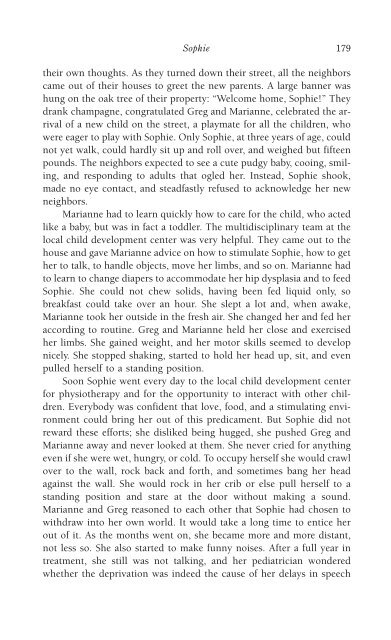978-1572305441
autism
autism
You also want an ePaper? Increase the reach of your titles
YUMPU automatically turns print PDFs into web optimized ePapers that Google loves.
Sophie 179<br />
their own thoughts. As they turned down their street, all the neighbors<br />
came out of their houses to greet the new parents. A large banner was<br />
hung on the oak tree of their property: “Welcome home, Sophie!” They<br />
drank champagne, congratulated Greg and Marianne, celebrated the arrival<br />
of a new child on the street, a playmate for all the children, who<br />
were eager to play with Sophie. Only Sophie, at three years of age, could<br />
not yet walk, could hardly sit up and roll over, and weighed but fifteen<br />
pounds. The neighbors expected to see a cute pudgy baby, cooing, smiling,<br />
and responding to adults that ogled her. Instead, Sophie shook,<br />
made no eye contact, and steadfastly refused to acknowledge her new<br />
neighbors.<br />
Marianne had to learn quickly how to care for the child, who acted<br />
like a baby, but was in fact a toddler. The multidisciplinary team at the<br />
local child development center was very helpful. They came out to the<br />
house and gave Marianne advice on how to stimulate Sophie, how to get<br />
her to talk, to handle objects, move her limbs, and so on. Marianne had<br />
to learn to change diapers to accommodate her hip dysplasia and to feed<br />
Sophie. She could not chew solids, having been fed liquid only, so<br />
breakfast could take over an hour. She slept a lot and, when awake,<br />
Marianne took her outside in the fresh air. She changed her and fed her<br />
according to routine. Greg and Marianne held her close and exercised<br />
her limbs. She gained weight, and her motor skills seemed to develop<br />
nicely. She stopped shaking, started to hold her head up, sit, and even<br />
pulled herself to a standing position.<br />
Soon Sophie went every day to the local child development center<br />
for physiotherapy and for the opportunity to interact with other children.<br />
Everybody was confident that love, food, and a stimulating environment<br />
could bring her out of this predicament. But Sophie did not<br />
reward these efforts; she disliked being hugged, she pushed Greg and<br />
Marianne away and never looked at them. She never cried for anything<br />
even if she were wet, hungry, or cold. To occupy herself she would crawl<br />
over to the wall, rock back and forth, and sometimes bang her head<br />
against the wall. She would rock in her crib or else pull herself to a<br />
standing position and stare at the door without making a sound.<br />
Marianne and Greg reasoned to each other that Sophie had chosen to<br />
withdraw into her own world. It would take a long time to entice her<br />
out of it. As the months went on, she became more and more distant,<br />
not less so. She also started to make funny noises. After a full year in<br />
treatment, she still was not talking, and her pediatrician wondered<br />
whether the deprivation was indeed the cause of her delays in speech



